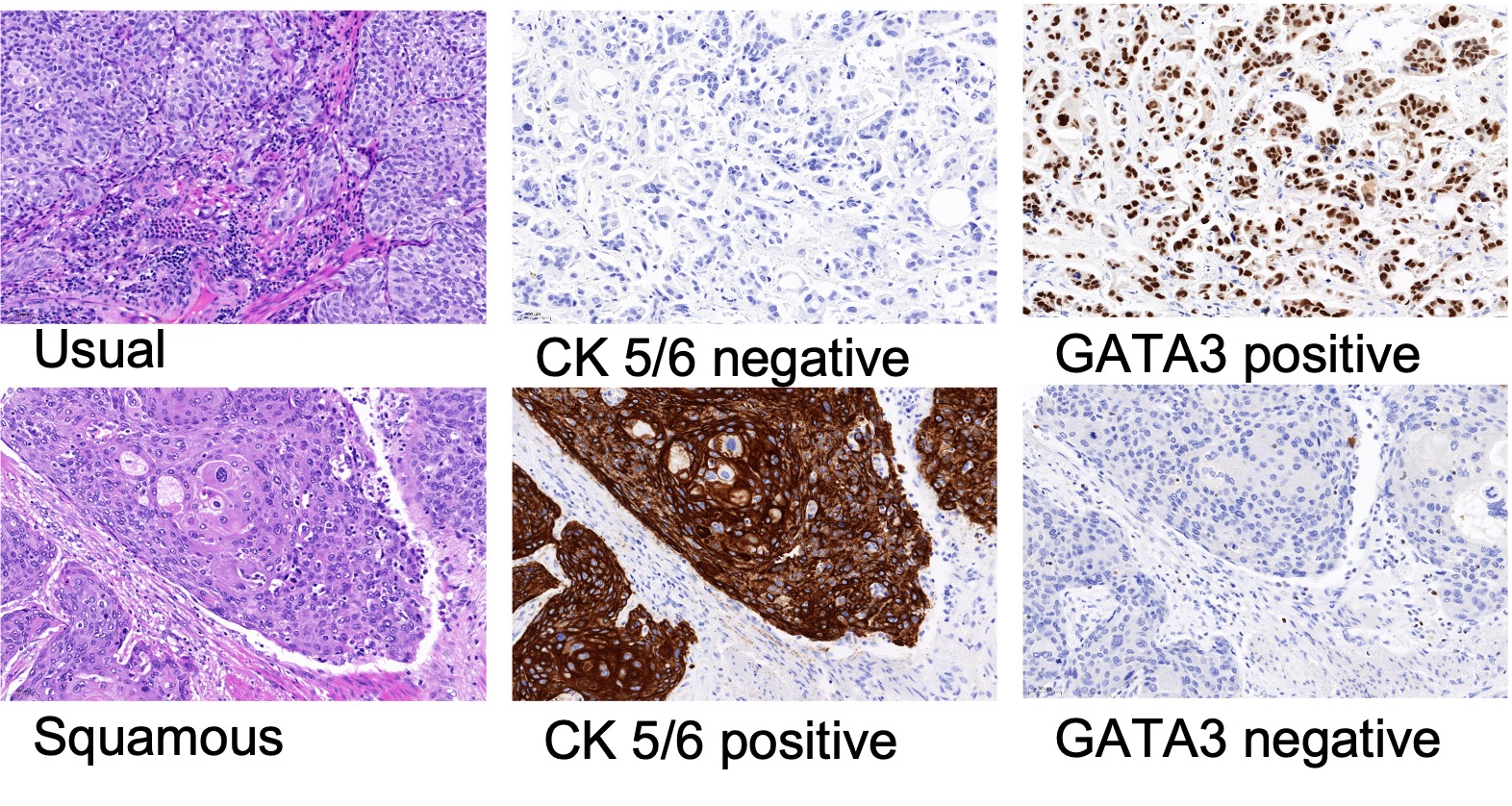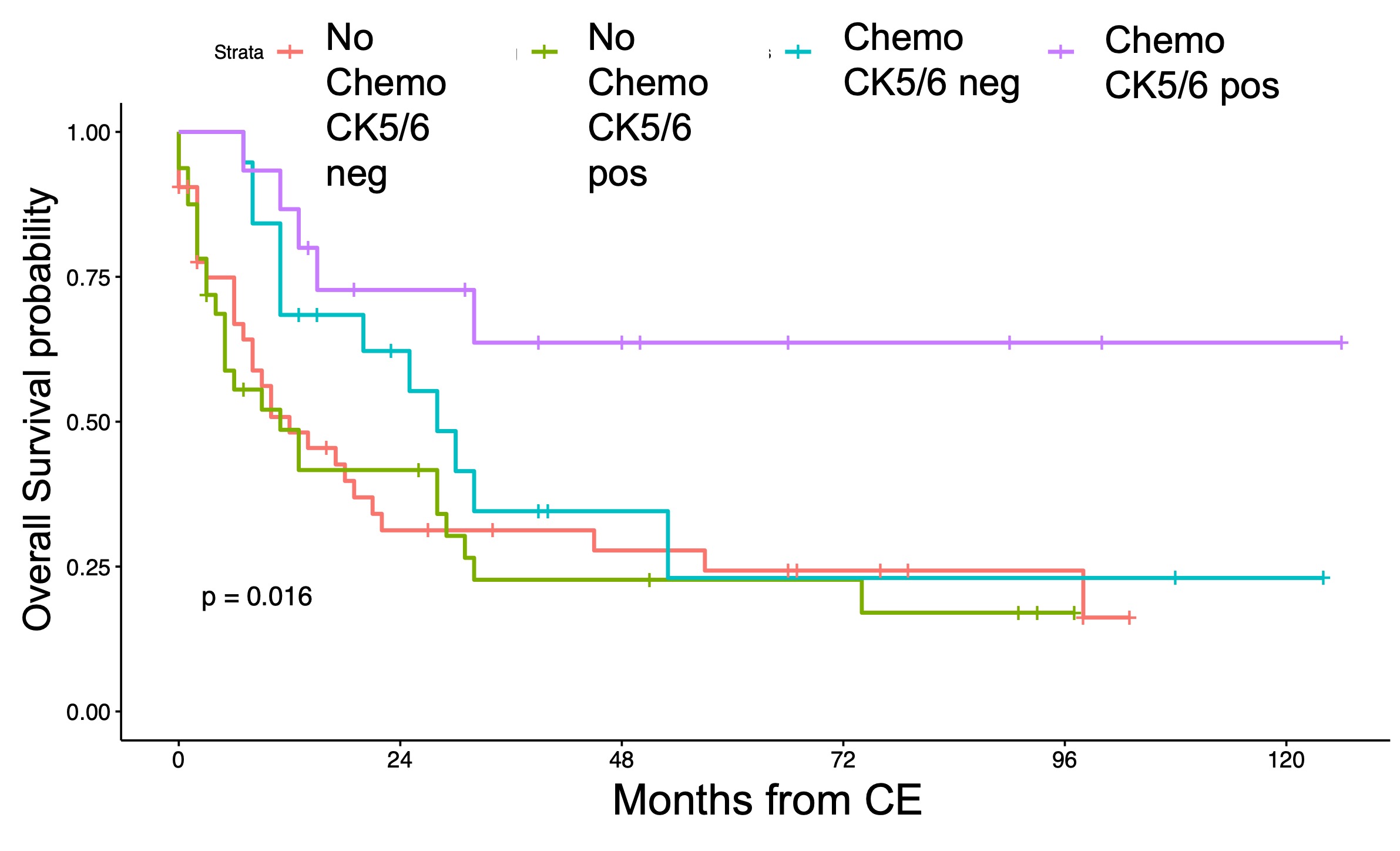Back
Poster, Podium & Video Sessions
MP03: Bladder Cancer: Invasive I
MP03-09: Impact of variant histology and immunohistochemistry on response to adjuvant chemotherapy in urothelial muscle-invasive bladder cancer
Friday, May 13, 2022
7:00 AM – 8:15 AM
Location: Room 222
Florestan Koll*, Luis Kluth, Felix Chun, Severin Banek, Katrin Bankov, Jens Köllermann, Henning Reis, Peter Wild, Frankfurt am Main, Germany
- FK
Poster Presenter(s)
Introduction: Cisplatin-based adjuvant chemotherapy may prolong survival rates after radical cystectomy in muscle-invasive bladder cancer (MIBC). But besides pathological tumor stage no biomarker based criteria to select patients that benefit from chemotherapy exist. It has been shown that patients with molecular “basal” tumors benefit most from neoadjuvant chemotherapy. But clinical translation and data for adjuvant chemotherapy are lacking.
The purpose of this study is to correlate “luminal” and “basal” protein expression with histological subtypes and to investigate the prognostic impact on survival and response to adjuvant chemotherapy.
Methods: 110 with MIBC patients undergoing radical cystectomy were pathologically re-evaluated. We performed immuno-histochemical (IHC) analysis of CK5/6, CK20, GATA3 and p53. Derived data was analyzed using descriptive statistical methods and uni-/multi-variable survival models.
Results: Expression of CK5/6 correlates with squamous histological subtype (89%) whereas expression of GATA3 was associated with micropapillary histology (100%). 5-year overall survival (OS) was 31% (95%CI 27-41). In the multivariate Cox-Regression model adjuvant chemotherapy had a significant survival benefit (HR 0.35 95%CI 0.2-0.6, p<0.0019). CK5/6-positive and CK20-negative cases showed the most improvement in OS and DFS with adjuvant chemotherapy compared with surgery alone.
Conclusions: In our cohort protein expression of CK5/6 and GATA3 was associated with histological variants of MIBC. IHC marker panels used in pathological routine might help to identify patients with “basal” tumor characteristics, that profit most from chemotherapy. Due to the heterogeneity of bladder cancer and contradictory published results, we will correlate results to molecular data and plan a prospective larger validation study.
Source of Funding: Deutsche Krebshilfe (German Cancer Aid)


The purpose of this study is to correlate “luminal” and “basal” protein expression with histological subtypes and to investigate the prognostic impact on survival and response to adjuvant chemotherapy.
Methods: 110 with MIBC patients undergoing radical cystectomy were pathologically re-evaluated. We performed immuno-histochemical (IHC) analysis of CK5/6, CK20, GATA3 and p53. Derived data was analyzed using descriptive statistical methods and uni-/multi-variable survival models.
Results: Expression of CK5/6 correlates with squamous histological subtype (89%) whereas expression of GATA3 was associated with micropapillary histology (100%). 5-year overall survival (OS) was 31% (95%CI 27-41). In the multivariate Cox-Regression model adjuvant chemotherapy had a significant survival benefit (HR 0.35 95%CI 0.2-0.6, p<0.0019). CK5/6-positive and CK20-negative cases showed the most improvement in OS and DFS with adjuvant chemotherapy compared with surgery alone.
Conclusions: In our cohort protein expression of CK5/6 and GATA3 was associated with histological variants of MIBC. IHC marker panels used in pathological routine might help to identify patients with “basal” tumor characteristics, that profit most from chemotherapy. Due to the heterogeneity of bladder cancer and contradictory published results, we will correlate results to molecular data and plan a prospective larger validation study.
Source of Funding: Deutsche Krebshilfe (German Cancer Aid)



.jpg)
.jpg)